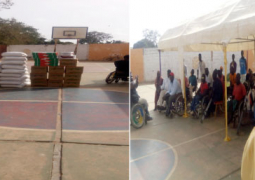The National Assembly Thursday inaugurated and launched a new internet service and website, which among others seeks to “better address the increasing need” for it to outreach and showcase the Assembly.
Funded by the
Under the project, the National Assembly computer room is equipped with 15 computers, 52 flash drives, 7 digital cameras, a printer and a scanner with all computers connected to high speed internet.
Speaking at the launching ceremony, Hon. Abdoulie Bojang, Speaker of the National Assembly, said this is one testimony of the many successes registered in their continuous drive to improve the ICT infrastructure of the parliament.
Noting that the 1997 constitution of the
“In furthering these principles and core values of democracy, we designed the strategic development and investment plan for the National Assembly,” he added.
According to him, the website and computer room being gradually developed as an internet based research centre demands actions that would generate results in order to engineer the growth and interrelated development of the National Assembly’s capacity.
He opined that the launching defies not only the scientific capacity, but equally the historical edifice of legislative transformation and growth.
The development of a website, Speaker Bojang said, is a process and not an event, noting that it will also continue to rise up to the challenges of a growing ICT sensitive infrastructure, thus measuring up to the goals and ideals of their strategic development and investment plan.
He further stated that an independent, effective and efficient legislature needs adequate capacity and infrastructural development.
“The quality of service offered by the National Assembly members and the National Assembly service staff should be able to show resourcefulness, dynamism and functionality,” he added.
Cherno Jallow, vice chairman, Board of Trustees of CIAM-Public Health Research and Development Centre, said members of the National Assembly want to have more access to the results of research conducted in The Gambia and elsewhere, to help inform their decision-making and parliamentary debates.
He explained that the project, which started in January 2010, is aimed at strengthening the capacity of the National Assembly to use available research evidence related to public health policy formulation and implementation.
Jallow added that the project also seeks to strengthen advocacy by civil society for increased use of evidence related to health policy formulation and implementation.
Also speaking at the launching was Mr. Ebrima Jobe, Director of ICT at the Ministry of Information and Communication Infrastructure.




